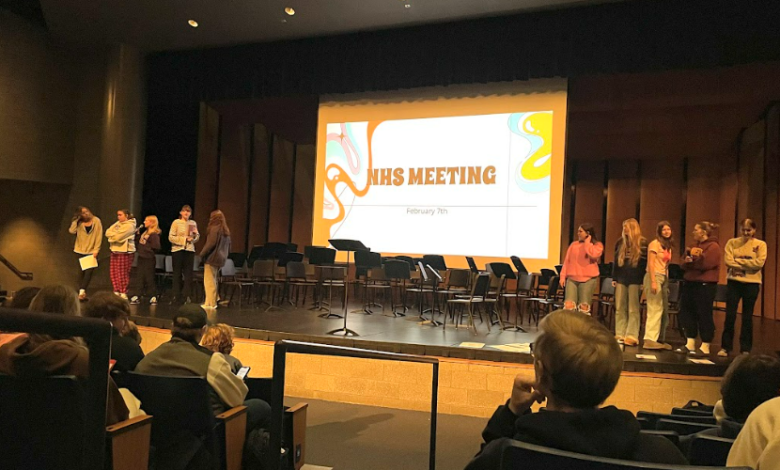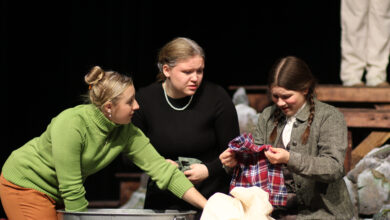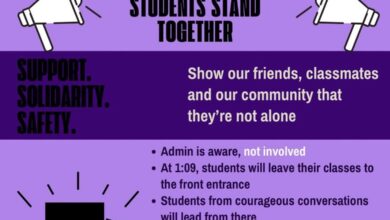
Students join the National Honor Society (NHS) for a wide variety of reasons. While most people join to look good for colleges, some join to be more involved in their community, and others join because of pressure from families, a longing for special tassels at graduation, or simply join on a whim. In order to be inducted into NHS, students must maintain a GPA of at least 3.67, attend one meeting a month, and complete 40 hours of community service from at least five different organizations. One of these hours comes from a project the student is in charge of putting together themselves. Of all of these requirements, 40 hours of community service is the hardest to complete. Harrison Klaphake ‘24 decided against joining the NHS for this very reason. “I’m very busy,” he stated. “I didn’t need another thing on my plate.”
The community service requirement is also the largest reason people drop NHS, according to Mrs. Cox and Mrs. Leach, who head Buffalo’s NHS chapter. “I think people get over-scheduled. They just have too many things going on, a lot of activities, or they’re working, and they’re trying to maintain good grades in their classes,” Cox said. “Sometimes people take on too much, and they need to figure out where they need to reduce some of their responsibilities in order to stay balanced.” “It is a really big time commitment,” Leach added, “40 hours is a lot to commit to”.
For the people who do join, the stress of the 40 hours tends to weigh down on them. “The time management aspect is very stressful for me,” Alex Budde ‘24 explained. McKenna Peterson ‘24, agreed with this sentiment, stating that “It’s stressful because I always feel like I’m behind on my hours. I have 27.5 hours, but I still feel like I’m behind”. Along with this stress, many students feel like colleges don’t care about being a part of the NHS as much as they used to. “I don’t feel like I’m getting as much out of it as I thought,” Peterson said.
While being a part of the NHS can be stressful, it can also be incredibly rewarding. “NHS obviously has aspects that are both helpful and stressful,” One NHS junior said. “There are traits that NHS has helped me develop, such as leadership and responsibility.” This junior isn’t alone in their experience. “The experiences themselves showed me a lot of new perspectives,” Budde remarked. “What goes into more management parts of an event, or what goes into running something like a thrift store.” Peterson added that NHS “Taught me how to learn through doing something.” She also explained that being in the NHS has led to her stepping out of her comfort zone and allowed her to be more social. “To me, It’s more helpful than stressful because, without it, I wouldn’t be as social as I am.”
Service is, according to Mrs. Cox and Mrs. Leach, the point of doing NHS. “I really like trying to create awareness in each individual student about what they can contribute to their communities,” Cox said. “It’s engagement, and it’s leadership, but, to me, I feel like it can become so personal to students.” Leach contributed to this idea, saying that “It gives the opportunity to our student leaders to explore how they can become leaders in other ways. . . They don’t know they have the ability to change the world. [NHS] is kind of a place where they can foster that and help it grow.” Leach also hopes that students will “take that experience with them and when they graduate to do good things as leaders when they’re out of school as well.”
Grace Panek ‘23 was a part of the NHS for her junior and senior year and has taken the lessons she learned from this time along with her to college, despite not receiving a scholarship from the NHS. “From being involved in NHS, the greatest thing I took away was the importance and impact of giving back. The overwhelming amount of gratitude that was received from small acts of service that I did throughout volunteering events was very rewarding.” Now she does small acts of kindness on a daily basis to spread that joy to others. “College can be challenging and random acts of kindness can really turn someone’s day around, and I can attest to this.” Panek has also joined a local charity organization at her college which helps provide for less fortunate moms. “We make birthday decorations, treats, and gifts for a young child who may not otherwise have the opportunity to have a stereotypical birthday celebration,” she said. “I have always loved being involved in something my whole life, therefore NHS did not spark my interest for volunteering, but it did inspire me to continue doing it.” Panek isn’t alone in this either. Lydia DesMarais ‘23 continues to volunteer at blood drives near her. “If I had not done NHS, I believe I would be less open to search for those volunteer activities.” DesMarais said. “NHS has taught me that service is important and that it’s enjoyable.”
Many students have saturated schedules, but for those who have the time, NHS has proven to be a helpful resource. “It’s worth it if you have free time that you want to fill. If you are very busy, or get stressed out easily, it isn’t worth it, but if you have free time then this is a great way to spend it.” said Peterson. Budde also found that it’s “incredibly rewarding to find the time [to volunteer] within a busy schedule.” One NHS junior added that “If you have the time and want to help others, it’s not stressful.”
Students should make themselves aware of the NHS requirements and potential benefits and stressors before making a decision on whether to join. “I knew that it included volunteering, but I had no idea before I joined that I had to get 40 volunteer hours.” Peterson shared. “I don’t regret joining NHS, but I wish I had asked more people about it first so I knew fully what I was getting myself into.” Of all the people interviewed, both NHS members and non, no one regretted their decision. NHS can be an incredibly rewarding experience or an incredibly stressful nightmare. The worth of the NHS depends on how much a student values the opportunity to provide extensive acts of service and, of course, how much time they have to provide those services.





